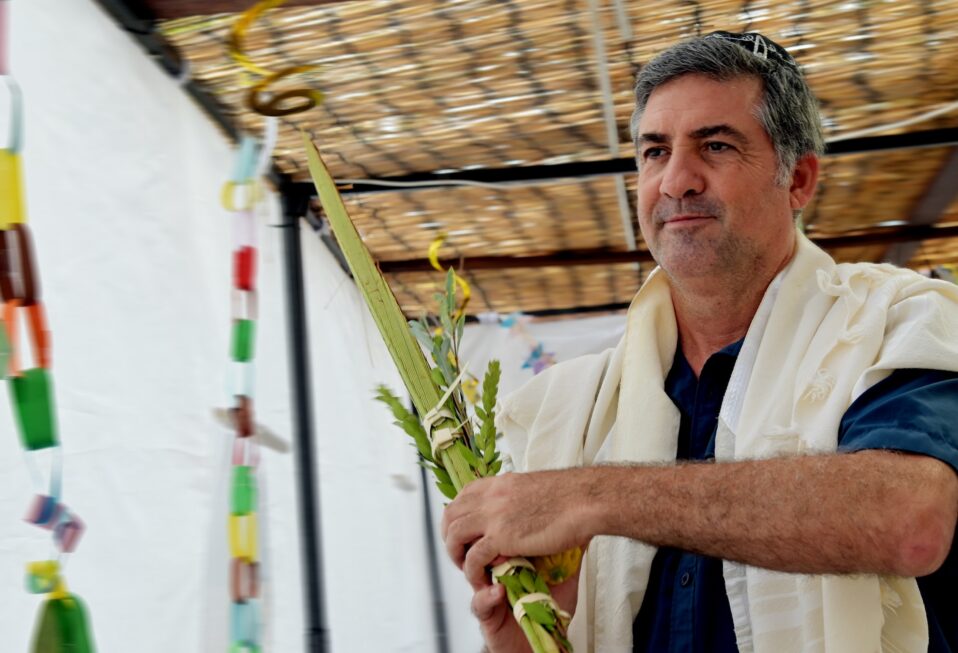By Stephen Faircloth
“On the fifteenth day of the seventh month the LORD’s Festival of Tabernacles begins, and it lasts for seven days. The first day is a sacred assembly; do no regular work. … Live in temporary shelters for seven days: All native-born Israelites are to live in such shelters so your descendants will know that I had the Israelites live in temporary shelters when I brought them out of Egypt. I am the LORD your God” (Leviticus 23:34-35, 42-43).
Each year as autumn arrives, Jewish families and communities around the world step outside their homes to build temporary shelters called sukkot or “booths.” For one week they eat, pray, and often sleep beneath roofs made of branches and palm fronds. Through this ancient and sacred tradition of faith and remembrance, they recall the time when God led their ancestors through the wilderness and provided for every need.
Sukkot, also known as the Feast of Tabernacles, is a festival of both thanksgiving and remembrance. It celebrates the harvest while recalling the forty years Israel spent wandering in the desert. During that time, the people lived in tents, utterly dependent on God for food, water, and daily direction in every step. The sukkah or “booth” is a visible reminder that true security is not found in walls or possessions, but in the presence and faithfulness of the Lord.
The Feast of Tabernacles was one of the great pilgrimage festivals when the Israelites were commanded to go up to Jerusalem to worship. It was a time of joy and celebration, as families gathered to give thanks to the God who sustained them. Every part of the festival pointed back to Him, from the waving of palm branches to the offering of fruit from the harvest. Each element reminded them that every blessing came from His hand.
During the feast, the roof of the sukkah is made thin enough to see the stars shining above, symbolizing deep trust in God’s covering. Sitting beneath it, worshippers are reminded that even when the world feels chaotic and unstable, God’s shelter remains sure. His protection is not fragile, even when our circumstances are.
Sukkot also looks forward to a greater promise. The prophet Zechariah wrote that one day all nations will come to Jerusalem to celebrate the Feast of Tabernacles and to worship the Lord as King. This vision points to the coming reign of the Messiah when God will dwell among His people and all creation will rejoice in His presence.
When Jesus walked the earth, He too went up to Jerusalem for the Feast of Tabernacles (John 7). Standing in the Temple courts, He declared, “If anyone thirsts, let him come to Me and drink.” His words transformed the meaning of the feast. No longer would people need to dwell in temporary shelters to experience God’s presence. Through Christ, God came to dwell permanently with His people.
Sukkot reminds us to pause, give thanks, and dwell under the covering of our heavenly Father. It calls us to rest in His faithfulness, to rejoice in His provision, and to look forward to the day when He will make His home among us forever.
Stephen Faircloth is the President of CBN Israel, an initiative dedicated to sharing the true story of the Jewish nation and inspiring a global community of Christians to stand with Israel and support her people in need. Our vision is to reshape the global conversation about Israel by fostering understanding, hope, and healing between Jews and Christians around the world. For more than 50 years, the Christian Broadcasting Network has supported Israel. By joining CBN Israel, you become part of this enduring legacy, transforming lives today and strengthening Christian support for Israel for generations to come.




Post a comment